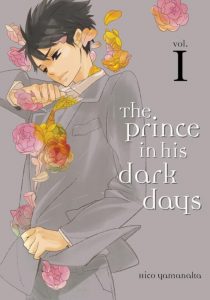By Hico Yamanaka | Published by Kodansha Comics
 Seventeen-year-old Atsuko is desperate for cash. Her father is an ungrateful drunk, they’re so poor that she’s mocked by classmates for her lack of personal hygiene, and she has resorted to fleecing perverted old men just so she can eat. Shortly after a chance meeting in which she runs into her male doppelganger, Itaru, she is kidnapped by his rich friend, Ryo Sekiuchi, and hired to impersonate Itaru (who has gone missing) for one million yen. Atsuko agrees and tutoring commences. She meets some nice people who are concerned for her welfare and appreciative of her effort, which is something she hasn’t experienced before, and learns that happiness isn’t automatic, even if you live in a huge, beautiful mansion.
Seventeen-year-old Atsuko is desperate for cash. Her father is an ungrateful drunk, they’re so poor that she’s mocked by classmates for her lack of personal hygiene, and she has resorted to fleecing perverted old men just so she can eat. Shortly after a chance meeting in which she runs into her male doppelganger, Itaru, she is kidnapped by his rich friend, Ryo Sekiuchi, and hired to impersonate Itaru (who has gone missing) for one million yen. Atsuko agrees and tutoring commences. She meets some nice people who are concerned for her welfare and appreciative of her effort, which is something she hasn’t experienced before, and learns that happiness isn’t automatic, even if you live in a huge, beautiful mansion.
I’m on the fence with how I feel about this volume. It’s not nearly as insightful as it could be, and so far the focus is more on Atsuko’s circumstances (first crappy, then unfamiliar) than on Atsuko herself. Her insta-love—after opening the manga by declaring that the greatest misfortune in the world is to fall in love— for Itaru’s friend Nobunari is also completely sudden and unconvincing. A more nuanced interpretation would suggest that Atsuko is so starved for affection that she’ll latch on to any form of kindness, but I have doubts that the mangaka is thinking that deeply about it at all.
That said, there were some things I liked about it. Ryo’s backstory, for example, and his reasons for wanting to protect Itaru from future repercussions from his controlling family. I also like that Itaru may have run off because he is gender nonconforming and that Nobunari seems to be in love with him. It’s probably not good to be more interested in the person who’s off-screen than the actual protagonist, but at least that’s something. Another point in the series’ favor is that it is short. I reckon I like it well enough to see it through to the end.
The Prince in His Dark Days is complete in four volumes. Kodansha will release volume two later this month.




















Recent Comments